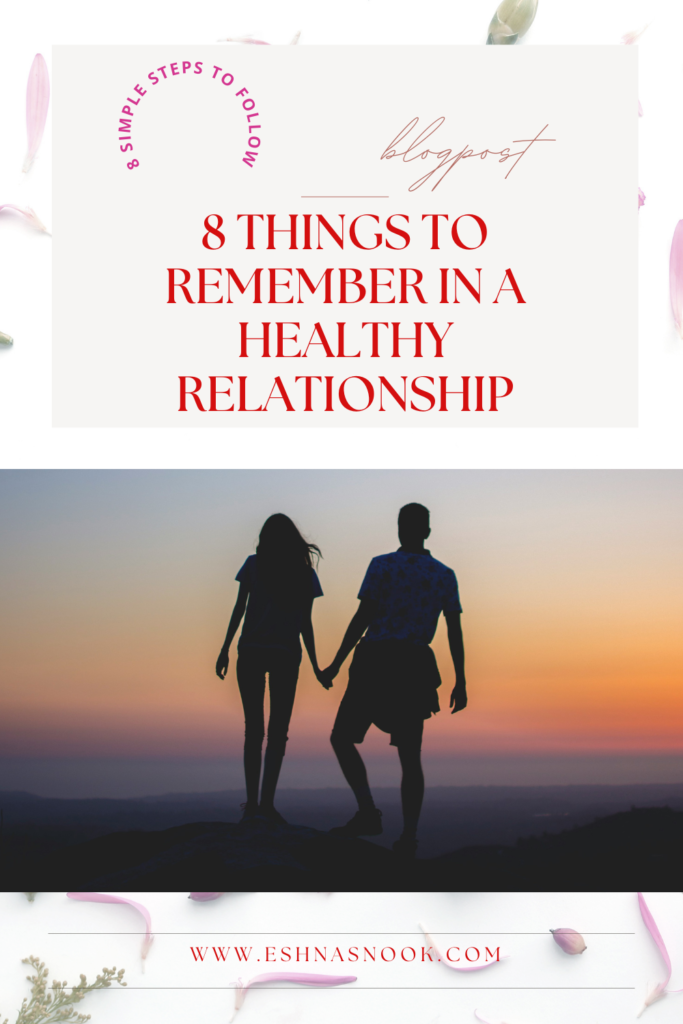Life thrives on healthy relationships.
From our closest family ties to the bonds we forge with friends, colleagues, and even strangers, how healthy our relationships define our experience of the world.
But navigating these connections can be challenging.
Misunderstandings, conflicts, and differing needs can often create strain and distance.
The good news?
Investing in your relationship-building skills can yield incredible rewards, fostering joy, support, and a sense of belonging.
8 key tips to help you strengthen your connections and build fulfilling and healthy relationships:
1. Master the Art of Active Listening
Communication is the cornerstone of any relationship, and active listening takes it to a whole new level.
It’s more than just hearing the words your loved one is saying; it’s about truly understanding their emotions, needs, and perspectives.
Stephen Covey, author of "The 7 Habits of Highly Effective People," emphasizes, "Seek first to understand, then to be understood."
Here’s how to become an active listener:
- Pay attention: Put away distractions, maintain eye contact, and be fully present in the conversation.
- Reflect and paraphrase: Summarize what you’ve heard to ensure understanding and avoid assumptions. Say something like, “So what I’m hearing is that you feel hurt because…”
- Ask clarifying questions: Seek deeper understanding without judgment or interruption.
- Acknowledge their emotions: Validate their feelings, even if you don’t agree with their viewpoint. You can say, “It sounds like you’re feeling frustrated, and that’s completely understandable.”
By actively listening, you build trust, strengthen intimacy, and create a safe space for open communication.
2. Embrace the Power of Empathy
Imagine walking in another person’s shoes, seeing the world through their eyes. That’s the essence of empathy, a crucial skill for navigating conflicts and fostering deep connections
As cognitive neuroscientist Daniel Siegel puts it, "Empathy is the ability to stand in the shoes of another person, to understand their perspective on the world, to see yourself in relation to them."
Here are some ways to cultivate empathy:
- Consider their perspective: Try to understand their thoughts, feelings, and experiences, even if you disagree.
- Validate their feelings: Acknowledge their emotions, even if you don’t condone their actions.
- Offer support and understanding: Let them know you’re there for them, without judgment or blame.
- Seek common ground: Look for shared values or experiences that can bridge any divides.
By practicing empathy, you create a foundation of understanding and compassion, strengthening your connection and fostering more productive conflict resolution.
3. Speak Your Truth with Kindness
Sharing your thoughts and feelings is vital for healthy relationships, but how you do it matters. Expressing yourself with kindness and respect paves the way for more constructive communication and deeper connection.
- Use “I” statements: Speak from your own perspective and avoid accusatory language. For instance, instead of saying, “You never listen to me,” try, “I feel hurt when I feel like I’m not being heard.”
- Focus on feelings: Share how their actions or words impacted you, rather than attacking their character. You can say, “I felt disrespected/hurt when…”
- Focus on the issue, not the person: Clearly express what’s bothering you without making personal attacks.
- Practice respectful disagreements: Acknowledge differences of opinion without dismissing or invalidating the other person’s perspective.
By communicating with kindness and clarity, you foster a safe space for open dialogue and avoid escalating conflicts, ultimately strengthening your connection.
Related Post: How to communicate with Friends
4. Celebrate the Joy of Shared Experiences
Life’s moments, big and small, are the building blocks of our relationships.
Sharing experiences, from everyday conversations to meaningful adventures, strengthens bonds and creates lasting memories.
- Engage in shared activities: Whether it’s cooking a meal together, taking a walk in nature, or pursuing a new hobby as a couple, make time for activities you both enjoy. Shared activities provide opportunities for laughter, conversation, and creating positive memories that solidify your connection.
- Plan meaningful outings: Schedule regular date nights, family outings, or group adventures to connect outside of routine routines. These outings can be anything from attending a concert or sporting event to exploring a new part of town or going on a weekend getaway. Stepping outside your comfort zone and trying new things together fosters a sense of excitement and shared discovery, strengthening your bond.
- Celebrate milestones: Acknowledge birthdays, anniversaries, or achievements, big or small, to show your appreciation and solidify your bond. Celebrating milestones demonstrates that you care and are invested in each other’s happiness. These celebrations can be elaborate or simple, but the act of acknowledging shared accomplishments and moments of joy reinforces the connection.
- Embrace spontaneity: Be open to unplanned moments of joy, like grabbing coffee with a friend or taking a weekend road trip. Spontaneous adventures can spark new experiences, laughter, and create a sense of aliveness in your relationship. These unexpected moments can become cherished memories that strengthen your connection.
By creating shared experiences, you build positive memories, strengthen communication, and create a sense of togetherness, solidifying your connections.

5. Nurture Appreciation and Gratitude
Expressing appreciation for the positive aspects of your relationships strengthens the bond and fosters a sense of security and aids in healthy relationships.
As Robert Brackett, a psychology professor, suggests, "Gratitude turns what we have into enough."
Here are some ways to show appreciation
- Offer specific compliments: Thank your partner for making dinner, compliment a friend for their listening ear, or tell your child how much you appreciate their help.
- Express affection through words and actions: A simple “thank you,” a hug, or a handwritten note can go a long way.
- Celebrate small wins: Acknowledge and celebrate each other’s achievements, big or small.
- Practice random acts of kindness: Do something thoughtful and unexpected to show you care, like leaving a love note in their lunchbox or picking up their favorite coffee.
By expressing appreciation and gratitude, you reinforce the positive aspects of your relationships and create a climate of mutual respect and affection.
6. Embrace Forgiveness
Holding onto grudges and resentment can poison even the strongest relationships.
For a healthy relationship, forgiveness is a gift you give yourself, allowing you to let go of negativity and move forward.
As the Dalai Lama teaches, "Holding on to anger is like drinking poison and expecting the other person to die."
Here are some steps towards forgiveness:
- Acknowledge the hurt: Allow yourself to feel your emotions before you can move on.
- Choose to forgive: This doesn’t mean condoning the other person’s actions, but rather releasing yourself from the burden of anger.
- Communicate your feelings (optional): If appropriate, talk to the other person about how their actions affected you.
- Focus on healing and moving forward: Let go of the resentment and focus on rebuilding the relationship.
Forgiveness is a powerful tool for healing and strengthening your relationships.
7. Healthy Boundaries for Healthy Relationships
Healthy relationships allow space for individual growth.
Setting boundaries around your time, needs, and personal space allows for mutual respect and prevents resentment.
Here are some ways to set healthy boundaries:
- Identify your needs: What do you need to feel comfortable and respected in the relationship?
- Communicate your boundaries clearly and calmly: Let the other person know what behaviors are and aren’t acceptable to you.
- Be prepared to enforce your boundaries: If someone disrespects your boundaries, calmly but firmly communicate the consequences.
By setting and enforcing healthy boundaries, you create a safe and respectful space for your relationships to thrive.
8. Be a Source of Support
Life throws challenges, and strong relationships provide a safety net of support during difficult times.
Here are some ways to be a source of support:
- Offer a listening ear: Be there for your loved ones when they need to vent or share their struggles.
- Offer practical help: This could be anything from helping with errands to providing childcare.
- Offer emotional support: Validate their feelings and offer words of encouragement.
- Respect their boundaries: Don’t pressure them to talk if they’re not ready or offer unsolicited advice.
Remember, building healthy relationships requires ongoing effort and dedication.
These tips are not a magic formula, but rather tools to guide you on your journey.
Celebrate your progress, forgive yourself for setbacks, and most importantly, be patient and kind to yourself and others.
By being a source of support, you deepen your relationships and show your loved ones that you care.
Remember, every effort you make toward stronger connections enrich your life and contribute to a more fulfilling and joyful world.
Take the first step today, and watch your relationships blossom with renewed understanding, trust, and love.



Your words are a reminder to cherish every moment and invest in the joy of shared experiences.
Yes.. life is made up of moments!
Thanks ..
These are great points for all relationships. I have lost friends because they don’t put any effort into sustaining a friendship.
Agree.. it takes time and effort from both the partners to keep a relationship healthy. Thanks for reading.
I wanted to say that one or the other was most important but after going through the list these are all really essential to building and maintaining healthier relationships!
Thanks for Liking my Post. Glad you could find some takeaways from it.
These are important points in a relationship. I too have lost friends, even my son, for not putting the effort into it saving our relationship with each other.
Oh.. thats sad. I hope they realise what they have lost. there is always hope for reconciliation.. Hoping good things happen at your end.
These are such great tips for building a healthy relationship. I’ll surely keep these tips in mind always.
Thanks!
Embrace Spontaneity is something I would really like to follow from the tips that you had given above. Your article was very thoughtful and beautiful!
Thank you so much!